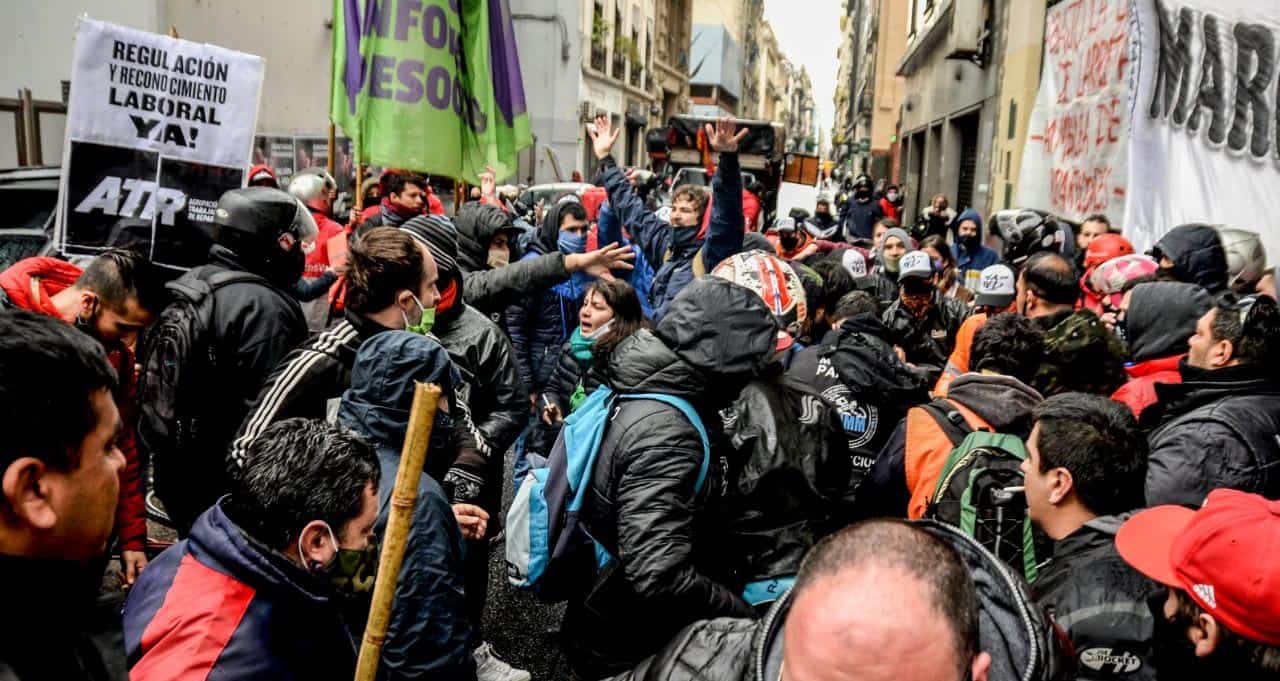Contxto – Last Thursday the local parliament of Buenos Aires passed a law regulating certain aspects of last-mile delivery services. In a nutshell, the delivery companies—like Rappi, UberEats, Glovo, and PedidosYa—broadly liked it and the delivery workers broadly hated it.
How they both deal with the fallout will have implications for last-mile delivery in the rest of Latin America.
Rappi, UberEats, Glovo, and PedidosYa: Happy apps
The Argentinian capital now has a new regulatory regime which has over all pleased last-mile delivery companies. The law makes it official that their drivers must now:
- Have no registered traffic offenses
- Be on a register of delivery workers
But, best of all for the companies, the government has now officially made them “intermediaries”, freeing them of all the onus of being formal employers to their deliverers.
This is why the workers are not happy, even if, in part, the law on paper looks rather good for them. On the positive side, the law states that last-mile apps must provide workers with:
- Insurance
- Road training
- Protective equipment, both in terms of road safety as well as healthcare kit during the pandemic
Problem is, it does not address the key underlying issue that has workers riled up.
Delivery workers counter-attack
The increasingly organized delivery workers are not taking the matter sitting down.
They are not happy at all with this law and actually greeted its passage on the footsteps of the Buenos Aires local legislature. Things got rowdy and violence erupted.
In correspondence with Contxto one of many app delivery workers’ organizations, Redapps Unidos Argentina, stated that:
We are against the approved law. We believe it’s harmful to deliverers. It seems to have been made on the orders of the companies themselves. Furthermore, we believe that it may set a precedent for other cities to draw up similar laws. Despite the modifications, many responsibilities and penalties revert to the deliverers.
Redapps Unidos Argentina spokesperson
But the action did not end there. Even though the law is a fait accompli, the delivery workers are planning their next move, and they’re doing it on a much bigger scale.
On Monday (20), Contxto found out that a delivery workers’ organization with a more hands-on approach to protest, Agrupación de Trabajadores de Reparto (ATR), were in talks with their Mexican counterparts to coordinate a regional response. ATR was the main contingent on the streets, protesting the passing of the law.
We have also contacted the last-mile delivery companies for comment as well. We’ll keep you posted as more information emerges.
Implications for last-mile delivery in Latin America
Given the workers’ accusations, the argument that this law is in fact just window dressing can’t be shaken off easily. Furthermore, it is exactly the sort of accusation that could make a difficult situation worse.
Why? Because, if the legislation is actually just pretending to address a problem by calling itself a “last-mile delivery law”, it will sink those who benefit from the status quo (i.e. the companies and, arguably, the government) into complacency as the workers are pushed to ever more extreme action.
These issues must be addressed. Even if every single individual involved is not satisfied. To not do so can only serve to radicalize dissatisfied deliverers who have so far been overwhelmingly peaceful and reformist.
Understanding the politics behind these movements is essential, because the workers’ “union” is rather a loose alliance of different deliverer’s organizations with divergent strategies. While some are rather conciliatory others are more radical in their approach; which one predominates will depend on how their demands are being addressed.
On the flip side though, the problem for the apps is the underlying economic model behind their successful last-mile delivery strategies. They are utterly dependent on the flexible relationship between themselves and the workers. Remember, legally, the app does not hire the deliverers.
What is worse? For these companies to go under or for the big issues of the gig-economy to go unresolved. It is a question that the Latin American startup ecosystem must answer as a whole.
In the end, something’s got to give, and unless the companies and the workers sit down and get real creative to resolve the impasse, things could get much uglier than they did on the steps of the Buenos Aires local legislature.
Related articles: Tech and startups from Argentina!
-AG






